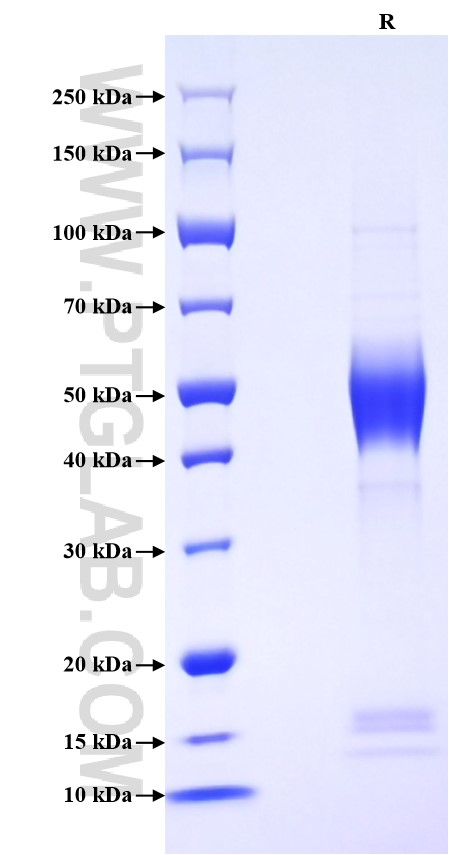Recombinant Human HBEGF protein (rFc Tag)
种属
Human
纯度
>90 %, SDS-PAGE
标签
rFc Tag
生物活性
未测试
验证数据展示
产品信息
| 纯度 | >90 %, SDS-PAGE |
| 内毒素 | <0.1 EU/μg protein, LAL method |
| 生物活性 |
Not tested |
| 来源 | HEK293-derived Human HBEGF protein Leu20-Thr160 (Accession# Q99075) with a rabbit IgG Fc tag at the C-terminus. |
| 基因ID | 1839 |
| 蛋白编号 | Q99075 |
| 预测分子量 | 42.0 kDa |
| SDS-PAGE | 14-17 kDa and 40-55 kDa, reducing (R) conditions |
| 组分 | Lyophilized from 0.22 μm filtered solution in PBS, pH 7.4. Normally 5% trehalose and 5% mannitol are added as protectants before lyophilization. |
| 复溶 | Briefly centrifuge the tube before opening. Reconstitute at 0.1-0.5 mg/mL in sterile water. |
| 储存条件 |
It is recommended that the protein be aliquoted for optimal storage. Avoid repeated freeze-thaw cycles.
|
| 运输条件 | The product is shipped at ambient temperature. Upon receipt, store it immediately at the recommended temperature. |
背景信息
The epidermal growth factor (EGF) family member, heparin-binding EGF-like growth factor, (HBEGF), is present in the uterus at the time of embryo implantation, and its expression in trophoblast (TB) cells of the placenta indicate its central role in early implantation and subsequent placentation. HBEGF protects TB cells from apoptosis, and promotes their invasion. Transmembrane HBEGF cleavage in response to low O2 initiates autocrine signaling that increases HBEGF levels to a concentration that inhibits apoptosis. The autocrine upregulation of HBEGF requires activation of its cognate receptors (ERBB1 and ERBB4), and downstream signaling through any one of three MAPK pathways initiated by MAPK 1/3, MAPK14 or MAPK8.
参考文献:
1. Yoo, H J et al. Developmental genetics vol. 21,1 (1997): 102-8. 2. Leach, R E et al. The Journal of clinical endocrinology and metabolism vol. 84,9 (1999): 3355-63. 3. Armant, D Randall et al. Development (Cambridge, England) vol. 133,4 (2006): 751-9. 4. Jain, Chandni V et al. PloS one vol. 11,10 (2016) e0163913. 5. Jessmon, Philip et al. Biology of reproduction vol. 82,5 (2010): 921-9.


